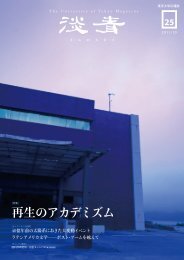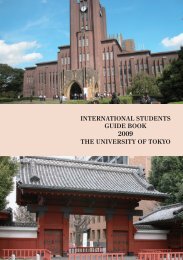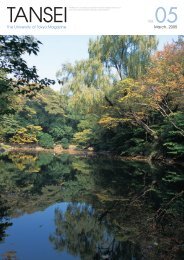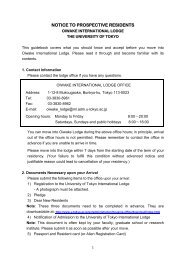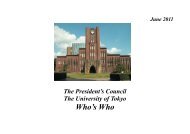brochure
brochure
brochure
You also want an ePaper? Increase the reach of your titles
YUMPU automatically turns print PDFs into web optimized ePapers that Google loves.
http://www.a.u-tokyo.ac.jp/english/index.html<br />
Keywords<br />
Agriculture,<br />
Bio-,<br />
Environment,<br />
Food,<br />
Veterinary,<br />
Aquatic<br />
Undergraduate — Senior Division<br />
Faculty of Agriculture<br />
Agricultural science covers a surprisingly wide spectrum of research activities.<br />
The fields of research and education in this science are arable land,<br />
forests and aquatic environments. We study life processes of animals,<br />
plants and microorganisms, making full use of techniques in the natural<br />
and social sciences. In the 21st century, the key challenge for agricultural<br />
science is to develop a system to continuously harvest nature’s bounty.<br />
Through its original course/major system, the Faculty aims at nurturing and<br />
training students who can tackle this challenge. The Faculty of Agriculture<br />
is largely divided into three Courses: the Applied Life Sciences, the Environmental<br />
Resources Sciences, and the Veterinary Medical Sciences.<br />
Students in the Applied Life Sciences Course learn about life processes<br />
related to plant and animal life from molecular and cellular levels to<br />
individual and group levels. This Course is further divided into six majors<br />
according to the specialized fields covered. The Environmental Resources<br />
Sciences Course, which is divided into eight majors, deals with issues of<br />
food, resources and regional development through science and technology<br />
involving environmental conservation and planning. The Veterinary Medical<br />
Sciences Course aims at understanding life processes and diseases of<br />
animals and trains students in veterinary medicine and public health. This<br />
six-year Course comprises a single major.<br />
The undergraduate students admitted belong to one of these 15 majors.<br />
Under this educational system, students learn subjects common to<br />
agricultural sciences, and systematically receive step by step education<br />
attaining a high level of specialization. Field Science is also studied utilizing<br />
affiliated facilities such as the Institute for Sustainable Agro-ecosystem<br />
Services located in Nishitokyo City and seven university forests from<br />
Furano, Hokkaido, in the north to Aichi in the south. We also have a wide<br />
variety of field educational facilities including the Veterinary Medical Center,<br />
Animal Resource Science Center, and the Fisheries Laboratory.<br />
Giant gingko trees on Yayoi Campus.<br />
Faculty of Agriculture Building 3.<br />
Contact e-mail address<br />
Student Support Team<br />
(Graduate Student Section)<br />
daigakuin@ofc.a.u-tokyo.ac.jp<br />
Office for International Cooperation<br />
and Exchange<br />
oice@ofc.a.u-tokyo.ac.jp<br />
International Student Section<br />
ryugaku@ofc.a.u-tokyo.ac.jp<br />
24



